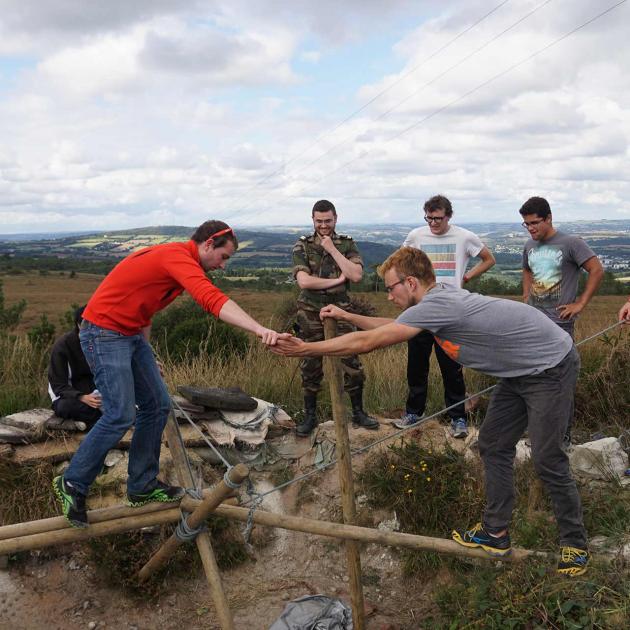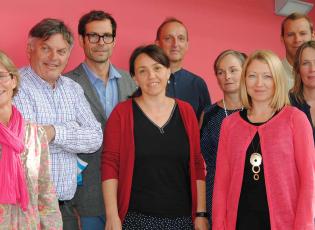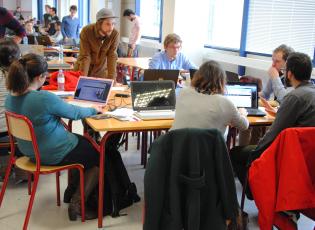
Double degrees and partnerships in France
Participate in an exchange or follow a complementary program at a French partner school
Engineering
- IMT Atlantique: 1- or 2-semester exchange
- ENSTA Paris: final-year exchange
- École Polytechnique: for IETA (military engineering) students only
- ENS Cachan: Research Master degrees and preparatory training for the agrégation (French education system competitive exam)
- ISAE Supaéro: IETA students who opt for an aeronautics major at the end of their 1st year can transfer to (depending on their academic results) and obtain their degree from ISAE Supaéro. Civilian students can do a final-year exchange at ISAE Supaéro.
- INSTN (National Institute for Nuclear Science and Technology): specialization year in atomic engineering
- Polyméca: double degree with ISAE-ENSMA, ENSMM, ENSIAME, SUPMÉCA, ENSIL-ENSCI, ENSEIRB-MATMECA et SeaTech
Other majors: management, architecture, nuclear, business, etc.
- Audencia: the « Audencia Graduate School » program offers a double degree from the end of the second year onwards.
- IAE de Brest: the students who have chosen the « Business Sciences and Engineering » specialism can opt to follow lessons in Master 2 Business Management and Administration
- Rennes Scool of Business: "Grande École" program or Masters degrees (double degree)
- Sciences Po Rennes: academic partnership in the fields of marine renewable energies and maritime project management
- Ecole Navale: after their second year of engineer training, civilian students with French nationality can take a double degree to become naval officers..
- Pépite Bretagne Brest: students with national étudiant-entrepreneur status can obtain a university degree
Careers and programs: personalize your curriculum
General and expert engineers
ENSTA Bretagne trains engineers able to design, develop, integrate and analyze complex technological systems in an international context.
Information technologies:
Hydrography - Oceanography
Research Engineers
ENSTA Bretagne offers double Master’s degrees in each of its technical disciplines. This is the ideal option for students targeting a career in research and considering pursuing doctoral studies. The dual competence research engineer profile is highly valued by major R&D organizations.
During their specialization year of study (3rd year) at ENSTA Bretagne, students follow courses at partner universities towards obtaining their double Master’s degree.
Business Management Engineers
This program strengthens management skills and provides engineers with a dual skill set that is very attractive to the high-tech sector while opening doors to opportunities in the service sector.
Several programs are available:
- ENSTA Bretagne program: to pursue specialized technical studies and a major in Engineering and Business Science.
- ENSTA Bretagne–IAE (School of Management) Brest program: in addition to the Engineering and Business Science major, double degree students follow second-year Master courses in Management and Business Administration at IAE Brest.
- ENSTA Bretagne and Audencia Business School (Nantes) double degree program: An initial 2 years at ENSTA Bretagne are followed by 2 years in Audencia Business School’s Grande Ecole program in Finance, Marketing and Management.
Entrepreneurial Engineers
In partnership with the ENSTARTUPS business incubator located on campus, you can prepare your business launch or develop your entrepreneurial skills and idea generation techniques.
With our internal program, you can take part in ENSTARTUPS projects and master classes, and students with national étudiant-entrepreneur status can also follow complementary university degree programs offered by PEPITE Bretagne in Brest.
Military Engineers
The IETA Military Engineering program trains engineers in designing and managing major defense programs for the French Government defense procurement and technology agency (DGA) and other organizations within the Ministry of the Armed Forces.
Important note: This program is open only to students with French nationality.
Elite student athletes and engineering studies
ENSTA Bretagne is an engineering school that can welcome elite student athletes. They have the option of extending the duration of their studies to be able to combine them with their competitions.
A multicultural environment
1/ Language learning
At ENSTA Bretagne, students learn 2 compulsory foreign languages, with the option of adding a 3rd through night classes. English, the international language of business, is compulsory for all students. Starting in 1st year, students prepare to achieve a certification level that will allow them to work in an English-speaking professional environment upon graduation.
In language classes (including French as a Foreign Language), students study and compare cultures while overcoming stereotypes.
"For several years now, language teachers have been integrating an intercultural aspect into their teaching. For example, in French as a Foreign Language classes, we invite students to compare the traditions, customs, organization and so on. of their country with those they have encountered in France" explains Catherine Adam, ENSTA Bretagne research professor.
2/ Intercultural communication and management
Students can opt to take the Intercultural Management module. Classes in this module are compulsory for non-francophone students and cover the French education system, engineering careers in France, communication in French culture, and more. They aim to equip students early on for careers in France, for example by assisting them in preparing assignments such as reports and oral examinations.
"Our goal is to develop the intercultural skills that engineers need to work in multicultural environments. If someone has a professional meeting with a Japanese company and has failed to take cultural aspects into account when preparing for it, they risk having several negative interactions within the first 10 seconds," explains Christophe Morace, who manages these classes.
Businesses and certification organizations (Conférence des Grandes Écoles, Commission des Titres d'Ingénieurs) also understand what's at stake in terms of interculturality.
"There are high expectations in this area. The subject is complex and fundamental. Sometimes people say that you have to experience this kind of professional situation first-hand to understand multicultural issues. However, we believe it's important to prepare students during their education to give them the keys to their success and that of their employers."
ENSTA Bretagne Human and Social Sciences Department research professor Christophe Morace has been studying this subject since 2009. He was employed in Germany’s industrial sector for almost ten years.
Teaching innovation: training innovative engineers
Regularly highlighted in evaluations (CTI, ISO, etc.) as one of the school’s strengths, human and social sciences have an important place in ENSTA Bretagne engineering programs, with subjects ranging from the practical (management, marketing, etc.) to the more reflective (sociology, philosophy, etc.). Cultural and artistic workshops on themes such as fine arts and theater also contribute to developing student creativity.
At ENSTA Bretagne, training is linked directly to research (the majority of teaching staff are researchers whose work feeds into their course content) and to business through internships, industry projects, conferences, etc.
Our programs place particular emphasis on developing an international outlook (language learning, international internships and exchanges), and our teaching methods integrate digital tools such as Moodle and ePortfolio.
ENSTA Bretagne teachers continually examine and develop their practices, for example through the annual symposium on Teaching Methods in Higher Education (QPES) and involvement in the European Society for Engineering Education (SEFI), as well as days dedicated to discussing teaching methods.
Research projects directly linked to innovation and sustainable development
From 2015 to 2017, ENSTA Bretagne’s Human and Social Sciences Department team led the Innoving 2020 research project. The requirements of European and French industrial renewal, new social expectations and evolutions in engineering have led to the need for more innovators. Innoving 2020 sought to improve teaching methods in order to train engineers able both to innovate and to implement their innovations in society.
Since September 2018, the team has been piloting A-STEP 2030, a European research project seeking to integrate sustainable development concepts into engineering education.
Lire aussi
Soft skills: the contribution of human and social sciences
Engineers, businesses and society
Human and social science classes develop the skills necessary for project management, workplace integration: economics, entrepreneurship, marketing, financial planning, communication, running meetings, decision-making, etc.
Self-knowledge and organizational psychosociology concepts are combined in these classes, which aim to assist students in defining a career path aligned with their personal goals and with societal needs and environmental constraints (economic climate, jobs market and ecological issues).
Through complementary disciplines such as history, philosophy and geopolitics, students are invited to examine the role of engineers in modern society and the challenges they may face in their engineering careers.
2 compulsory modern languages and an optional 3rd
The program emphasizes learning modern languages, which are indispensable tools both for work and for a wider understanding of the world.
- 1st compulsory language: English. Students work towards achieving at minimum a B2 level in order to work in an English-speaking professional environment.
- 2nd compulsory language: German, Spanish, Chinese or Portuguese (or French as a Foreign Language for international students).
- Optional 3rd language: the school adapts to beginners wishing to learn the above-mentioned languages or others such as Japanese or Russian.
Training for the global workplace
Our intercultural approach goes beyond language mastery: through role-play, future engineers learn techniques for job interviews in other cultural environments and for cooperation in and management of multicultural teams.

At ENSTA Bretagne, students benefit from an exceptionally wide range of personal development and cultural awareness workshops on subjects such as civilization (Chinese, Japanese, and Arabic), stress management, and the visual and performing arts. These 3rd-year workshops pave the way for learning to innovate.
Physical and sports activities are a key element of engineering training at ENSTA Bretagne. Physical education is a compulsory subject, and students can practice both individual and team sports. Sports contribute to self-knowledge, to understanding various roles (partner, opponent, referee, manager), to managing the difficulties of competitive situations, and more.
Leadership classes are lessons in living. A few kilometers from campus, in an ideal setting for this unique experience, teams of students tackle timed technical challenges, such as building a structure. Each student is evaluated in terms of their ability to take on a leadership role, and students are led in a structured brainstorming session on the qualities and attitudes expected of project and team managers.
Groups of 2nd-year students can choose between two serious games on the themes of business development (3 days to turn around a struggling business) or business creation (exploring all the stages of startup creation, from idea to market study to business plan).
Workplace culture and operational and organizational systems vary greatly from country to country, and these differences can quickly complicate interactions. For almost 10 years now, ENSTA Bretagne has offered intercultural management classes that help students evolve professionally in multicultural and international environments.









